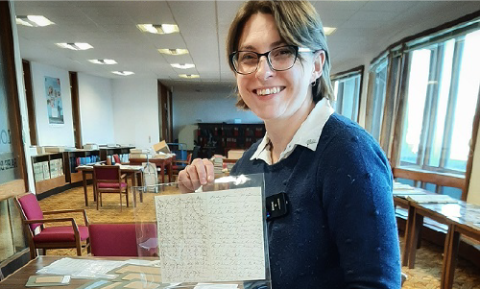OU Historian returns as expert consultant for second series of Lady Killers

Head of History Professor Rosalind Crone returns as Historical Consultant for the 10-part second series of BBC/StoryHunter production Lady Killers with Lucy Worsley, and appears throughout. The series broadcasts from 20 March on BBC Radio Four and as a box set on BBC Sounds.
Taking a contemporary, feminist perspective throughout, the unique true-crime podcast brings an all-female team together to investigate the ordinary lives and extraordinary crimes of women of the 19th and early 20th century. The inaugural series was one of the top ten most popular BBC podcasts in 2022, and Ros explained that “in Lady Killers Series 2, we have expanded our period and geography to bring you 100 years – a whole century – of female killing and living in Great Britain, North America and Australia.
“The period 1823 to 1923 witnessed some remarkable changes in the lives of women. New rights were acquired in areas such as child custody, married women’s property, marital separation and divorce, and politics through the franchise. However, such gains were often limited, they did not deliver equality between men and women, and some groups were excluded altogether. Sometimes the law was out of step with changing attitudes and needs.”
Presented by Lucy Worsley, the series spans shocking cases from England, Scotland, the USA and Australia, to expose the unthinkable actions of murderesses, with expertise from lawyers, psychologists, activists, comedians and barristers, including author and activist Deborah Frances-White, novelist Lynda La Plante OBE and barrister and prosecutor Sasha Wass KC.
Like the first series, Ros explains that “this is a series about women - their lives and problems - and we wanted to hear what they had to say about the circumstances they found themselves in. Each episode includes their words, extracted from the surviving historical evidence.”
Cases in the series include 1920’s “New Woman” Edith Thompson whose conviction for murder on the flimsiest of evidence is under review 100 years later; tavern keeper Mary McKinnon who faced a trial which largely dismissed the testimonies of sex workers; backstreet abortionist Elizabeth Taylor; and Margaret Garner, an enslaved woman who killed her own daughter to prevent her having a lifetime of servitude in every way.
Ros notes that “throughout the period, expectations about women’s social roles continued to shape the interpretation of the law, decisions about guilt and innocence, and the infliction of punishment, in ways that were both beneficial and highly detrimental.
“There is no doubt that in the hundred years since 1923 the lives of women in Britain, North America and Australia have experienced further dramatic change, sustained by unprecedented legislative achievements. However, there remains much work still to do, not to mention great uncertainty. Studying these cases from the past can help us to find a way forward for women in the future.”
Further details of the series can be found at the BBC website.
Discover more about Professor Crone’s work, including on Victorian popular culture, the history of crime and policing, and the history of prisons and prison education.
Request your prospectus
![]()
Explore our qualifications and courses by requesting one of our prospectuses today.
